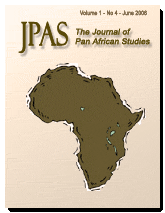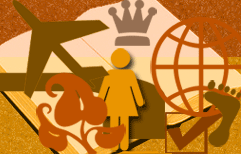ARCHIVED:
 Volume 1• Number 4 • 2006
Volume 1• Number 4 • 2006
● Editorial: The Dunham Technique
[view PDF]
● The Introduction of Saint Lucian Students to the Ancient World African Community
by Humphrey A. Regis.
[view PDF]
This article is a revised version of a paper the writer presented at the Seventeenth Cheikh Anta Diop Conference, convened September 30 to October 1, 2005 by the Association for Nubian and Kemetic Heritage (ANKH) in Philadelphia, Pennsylvania, USA. It reports on a project in which the writer has introduced the history of the World African Community to people in Saint Lucia in the Eastern Caribbean. The project covers the history from the beginning of human life in Africa to the coming of members of the Community to the Caribbean and other parts of the western hemisphere. The paper marks the 10th anniversary of the launching of the project at Vieux Fort Comprehensive Secondary School (VFCSS) in Saint Lucia in May and June of 1995. Since then, the writer has introduced the history directly (in lectures and special presentations) and indirect�ly (through teachers of history) to more than 1,500 young learners in secondary schools, directly (in lectures) to more than 250 learners in adult education programs, and indirectly (through newspaper articles and radio and television appearances), to other audiences, in Saint Lucia. The writer dedicates this work to the late S. Wayne Louis. With fellow history teachers Sylvester Clauzel and Lydia Sadoo, he collaborated in the launching of the project at VFCSS up until his passing almost three years later; and was extremely active in the promotion of an understanding of the history among students in the school, students in other schools, and the general community.
● The Virtues and Challenges in Traditional African Education
by John K. Marah.
[view PDF]
This paper examines the virtues and failures of traditional African educational systems, in the context of continental Pan-Africanism, and argues that traditional African educational systems must be complemented by a Pan-African educational system that transcends micro-nationalisms.
● Practical Peacemaking Wisdom from Africa: Reflections on Ubuntu
by Timothy Murithi.
[view PDF]
An examination of the cultural world-view known as Ubuntu which highlights the essential unity of humanity and emphasizes the importance of constantly referring to the principles of empathy, sharing and cooperation in our efforts to resolve our common problems, thus discussion focus on how Archbishop Desmond Tutu utilized the principles of Ubuntu during his leadership of the South African Truth and Reconciliation Commission. This study will also outline the five stages of the peacemaking process found among Ubuntu societies, including: acknowledgement of guilt, showing remorse and repenting, asking for and giving forgiveness, and paying compensation or reparation as a prelude to reconciliation. Potential lessons for peace and reconciliation efforts are highlighted with the premise that the Ubuntu approach to the building of human relationships can offer an example to the world.
● Globalization and the Retrenchment of an African Economy: Revisiting Post - $18 Billion Debt Cancellation in Nigeria
by Ayandiji Daniel Aina.
[view PDF]
The embedded neo-colonialist exploits of globalization retrenches the Nigerian economy rather than strengthening it - thereby creating new threats to human security and development. Specifically, pre and post - $18 billion (USD) debt cancellation Nigeria reels in economic strangulation engendered by global capital. Nigeria has made and is making enormous contributions to the global economy, yet it remains at the receiving end of the side effects rather than through the gains of globalization with mounting debt profile, capital flight, local industry collapse, galloping inflation, weak currency, over-dependence on imported goods and services, mono-product economy, etc.
● Yor�b� Proverbs, Names and Consciousness
by Gb�nga F�s�k�.
[view PDF]
This discourse situates Yor�b� proverbs, names, role-expectations, aspirations and consciousness in relationship to building and contributing to the development of a national consciousness. The paper proceeds with a critical exposition of the general nature of Yor�b� proverbs, an exploration of the dialectical relationship between Yor�b� proverbs and names, and argues that this relationship instantiates a descriptivist theory of reference of names in the philosophy of language, with concluding particulars that critically espouses the values and virtues embedded in selected Yor�b� proverbs and names.
● Problem(s) of Theory and Theory Production in Africana Studies
by Karanja Keita Carroll
A review of Not Only the Master's Tools: African-American Studies in Theory and Practice edited by Lewis R. Gordon and Jane Anna.
[view PDF]
● Announcements
[view PDF]
- Cheikh Anta Diop International Conference
- African Heritage Studies Association
- GlobaLink-Africa Online Curriculum



